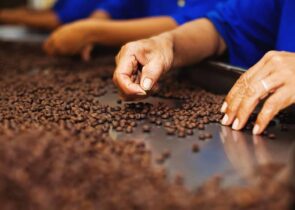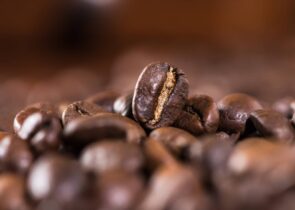It’s probably safe to assume we’re all coffee drinkers here, but unfortunately, not all of us are coffee-drinking world travelers. But just because we are stuck at home doesn’t mean our palates have to be; all you need to do is make sure you have the right cup of coffee, and you can be off on an adventure in minutes.
At A Glance: Our Top 5 Picks for Brazilian Coffee
With all the bean origins you have to choose from, it can be hard to determine what you get from each one. But we’re here to be your coffee tour guides, and our first stop takes us to South America, where we will dig into Brazilian coffee beans, their history, and why they seem to make their way into almost every blend on the market.
So, sit back, appreciate that the chair you’re sitting in is probably way more comfortable than an airplane seat, and let’s begin our journey!
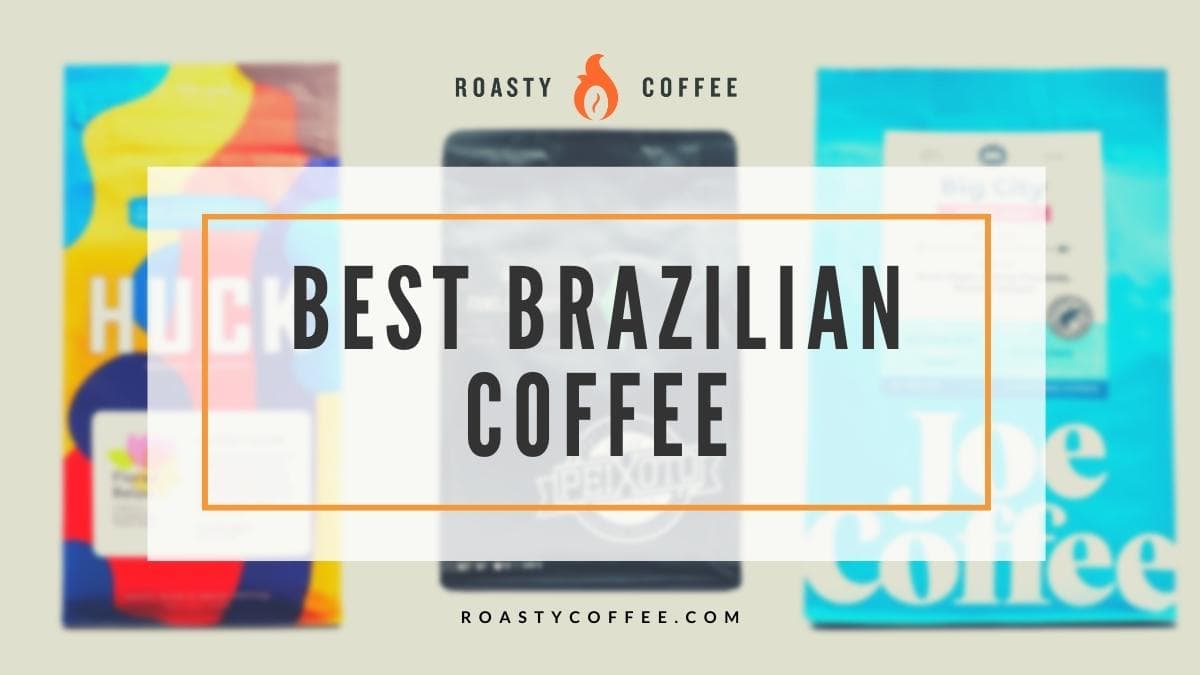
Quick Summary: The Best Brazilian Coffee
 | Our Top Pick Huckleberry Roasters - Flores Belas |
| Check Price → |
 | Klatch Coffee - Brazil Diamond Reserve |
| Check Price → |
 | Greater Goods Coffee Co. - Good Vibes |
| Check Price → |
 | Gimme! Coffee - Brazil Cerrado |
| Check Price → |
 | Peixoto Coffee Roasters - Família Peixoto |
| Check Price → |
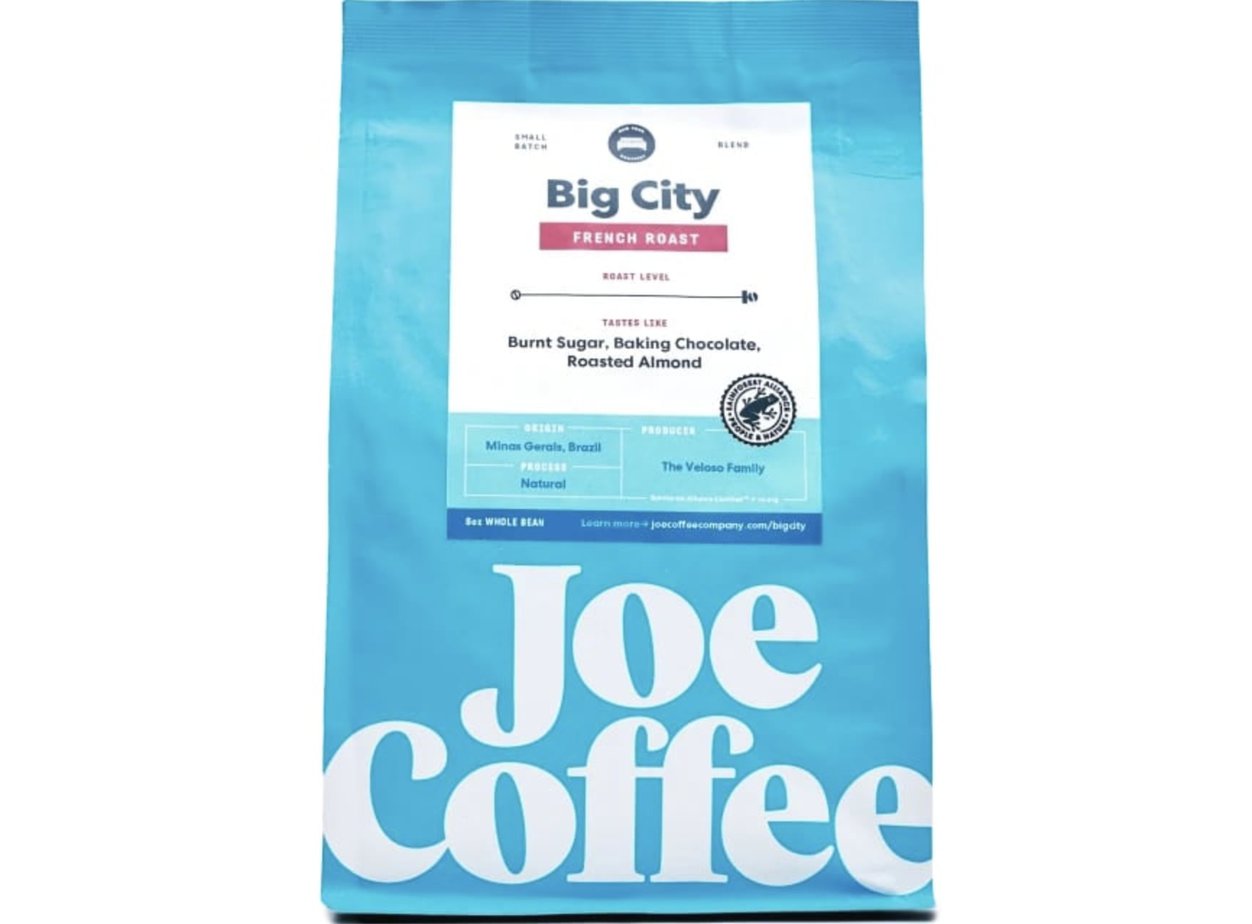 | Joe Coffee - Big City |
| Check Price → |
 | Volcanica Coffee - Santana Estate Brazilian Peaberry |
| Check on Amazon → |
 | Methodical Coffee - Brazil, Dulce Signature |
| Check Price → |
 | DELTA CAFÉS - BRAZIL |
| Check on Amazon → |
 | Buffalo Buck's - Brazil Santos Arabica Coffee |
| Check on Amazon → |
 | Pilao Coffee - Tradicional |
| Check on Amazon → |
A Brief History
Coffee isn’t native to the Americas. Instead, it arrived there intentionally. Francisco de Melo Palheta put the first Brazilian coffee plant into soil in 1727.
Legend has it that the Portuguese wanted in on the coffee market, but the governor of French Guiana was a bit less than cooperative when it was time to trade seeds. Palheta, who was sent on a diplomatic mission, supposedly wooed the governor’s wife. His efforts paid off, and she presented him with a bouquet with the coveted seeds hidden inside.
Those seeds were smuggled into the country, thus launching the Brazilian coffee industry. After the Haitian Revolution left many of Haiti’s coffee plantations burned, Brazil stepped up to accommodate the global demand* for coffee.
By the 1840s, Brazilian coffee beans accounted for 40 percent of the country’s exports, and after being in the business for barely a century, the country became the world’s largest coffee producer.
The second coffee boom was a prominent part of Brazil’s economy, culture, and politics, so much so that the political period is now referred to as café com leite (coffee with milk), as these were the nation’s two dominating industries.
By the 1920s, Brazil had nearly monopolized the international coffee market, controlling 80 percent of the world’s coffee production. That number has since declined, and despite government intervention to encourage diversification, 60 percent of Brazil’s exports were coffee beans in the second half of the 20th century. The country remains the largest coffee producer in the world today.
*Before then, Haiti produced joe for about half of the world’s coffee drinkers!
How does Brazilian Coffee Taste?
Brazilian coffee beans have a checkered past in terms of flavor and quality. In the 1980s, national officials pushed against attempts to amend export quotas that promoted the production of milder, high-quality beans. The proposed agreement fell apart in 1989.
As a result, the controlling force in Brazil’s coffee market, the Brazilian Coffee Institute, also dissolved, leaving room for free markets to flourish. The joe’s quality then significantly increased and led to the production of the types of coffee beans we see today.
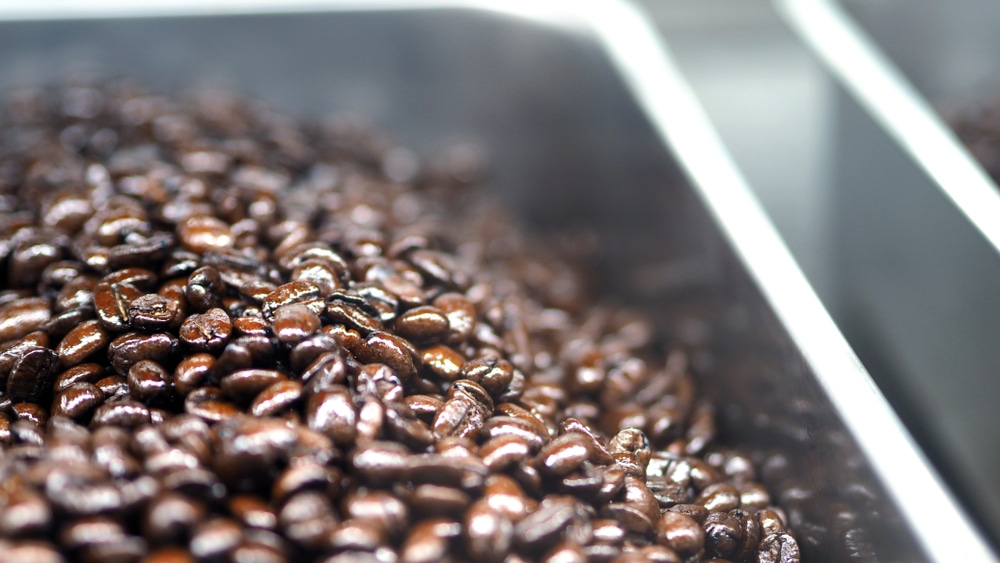
Because of Brazil’s history of favoring stronger beans, many still rely on the country’s java for espresso blends alone. You’ll detect notes of caramel and chocolate in this rich-bodied, mildly acidic brew that come together to create intensely pleasant, sweet flavors. However, other high-quality single-origin coffee beans are worth your time, too.
Brazilian Coffee Varieties
It’s impossible to deny the sheer amount of variation present in Brazilian coffee beans. And all this variety makes sense, given the country’s 14 major coffee-producing regions. Each coffee region is dispersed between seven different states:
- Minas Gerais (Sul de Minas, Cerrado Mineiro, Chapada de Minas, Matas de Minas)
- São Paulo (Mogiana, Centro-Oeste)
- Espírito Santo (Montanhas do Espírito Santo, Conilon Capixaba)
- Bahia (Planalto da Bahia, Cerrado da Bahia, Atlantico Baiano)
- Paraná (Norte Pionerio do Paraná)
- Rondonia
- Rio de Janeiro
At this point, we’re sure you can imagine the incredible diversity within this country. So there are options ranging from traditional, espresso-like java to new, experimental coffees with complex flavor profiles.
A Few Brazilian Bean Facts
Minas Gerais’s subregions account for about half of the country’s coffee production. However, small farms produce 60 percent of that. The Port of Santos (a.k.a., the busiest container port in South America) is located in São Paulo, and the Cerrado region is in Bahia. Espírito Santo produces the second-highest volume of coffee, but they are primarily robusta beans, which is why you won’t see much mention of it here.
Roasty Rankings: Our Picks for the Best Brazilian Coffee
Here are our picks for the best coffee beans from Brazil!
Huckleberry Roasters – Flores Belas

Huckleberry Roasters - Flores Belas
This gorgeously balanced cup is a Trade exclusive! Rich chocolate flavors pair beautifully with just a splash of orange acidity, and a deep caramel sweetness that lingers past the last drop.
If you want your morning cup to taste a little sweet without adding mounds of sugar, consider adding a bag of Flores Belas beans from Huckleberry Roasters to your coffee routine.
These medium-roasted beans have rich chocolate flavors that combine beautifully with notes of toffee and toasted almond. You’ll find a cup of this coffee comforting anytime you brew it, whether you sip it slowly on a cool afternoon or rush to slurp it down as you sprint out the door on a hectic morning.
Klatch Coffee – Brazil Diamond Reserve
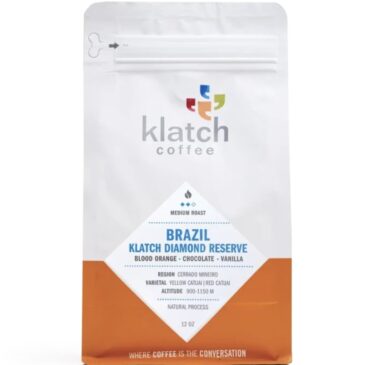
Klatch Coffee - Brazil Diamond Reserve
Big-bodied, with a rich chocolaty sweetness that yields to dark fruity notes of ripe black cherry.
Klatch Coffee roastmaster and CFO Mike Perry stumbled across these beans on one of his trips to Brazil and hand-selected them from three farms in the Cerrado Mineiro region. This medium roast is an excellent coffee for those who like sweet, fruity flavors, thanks to its blood orange, chocolate, and vanilla notes.
Like most Brazilian coffee, these beans were processed via the natural processing method. Each cup of this stuff has a balanced body and long finish, which means you’ll be thinking about how delicious it was even after you finish drinking it.
Greater Goods Coffee Co. – Good Vibes

Greater Goods Coffee Co. - Good Vibes
So complex but squeaky clean – we bet Brian Wilson would approve. Big and bold with a cocoa-like structure supporting a peanut-buttery sweetness.
Because we’re all about starting the day with good vibes, we think Greater Goods Coffee Co.’s Good Vibes joe is perfect for getting your morning brew on. And, true to the company’s name, purchasing these beans contributes to the greater good; portions of the profit support the Autism Society of Texas, an Austin-based organization dedicated to connecting people with autism to the resources they need.
These Cerrado Mineiro-sourced beans are versatile enough to go in almost any coffee maker, from an automatic drip machine to a French press to an espresso machine. Regardless of what you use to brew the medium-dark roast, the result is smooth and full-bodied coffee with notes of sweet dried cherry, peanut butter, and hot cocoa. The vibes are indeed good with this joe.
Gimme! Coffee – Brazil Cerrado

Gimme! Coffee - Brazil Cerrado
Rich chocolaty sweetness and notes of roasted walnut make this classic Brazilian profile a tried-and-true crowd pleaser.
Fortunately, you won’t have a hard time remembering Gimme! Coffee’s name, since “gimme coffee” is probably the first thing you say when you roll out of bed in the morning — at least, it’s the first thing we say, anyway. This New York-based roaster has been a leader in the third wave and specialty coffee industries since its establishment in 2000.
One of the products in Gimme!’s bean repertoire hails from the Cerrado region of Brazil. Since it is a medium roast, this java is balanced enough to please a variety of coffee drinkers, and its notes of sugar cane, hot honey cake, and cashew butter give it a nutty sweetness we think you and your crew of coffee lovers might enjoy.
Peixoto Coffee Roasters – Família Peixoto

Peixoto Coffee Roasters - Família Peixoto
A lusciously creamy body and cozy sweetness make this coffee a hug in a mug, with just a hint of citrus aromatics to keep things interesting.
According to Peixoto Coffee Roasters, the Familia coffee is designed to “open the minds on what Brazilian coffee can taste like and [break] down barriers that people have formed about coffee from Brazil.” To put it plainly, you should try this joe if you’re new to Brazilian beans and curious to see if they live up to the hype.
José Augusto Peixoto grows these beans on Fazenda São José da Boa Vista farm in the Sul de Minas region. After they are naturally processed, light-medium-roasted, and brewed, they create a sweet and clean cup of coffee capable of pleasing almost anyone.
This brew is the go-to product of Peixoto Coffee Roasters’ current collection of coffees, and with its hazelnut, honey, and berry notes, it’s not hard to understand why.
Joe Coffee – Big City

Joe Coffee - Big City
Full-bodied and rich, this roasty cup offers up plenty of honeycomb sweetness with all that deep, dark chocolate.
In the spirit of transparency, we admit that Joe Coffee’s Big City roast is not a single-origin Brazilian coffee. However, it’s such a popular product and a prime example of Brazilian beans blending well that it felt wrong to exclude it from our buying guide.
Big City is a blend of beans from the family-run Veloso Coffee in Brazil’s Cerrado region and a mother-daughter duo in Antigua, Guatemala. The marriage of these two types of beans produces a full-bodied coffee with sweet, comforting hints of burnt sugar, baking chocolate, and toasted nuts. Because it’s a French roast, it is among the darkest roast levels you can buy and has a nice smoky undertone.
Volcanica Coffee – Santana Estate Brazilian Peaberry
If you have never heard of peaberry coffee before, we have a detailed breakdown of those beans you can check out. However, if you’re familiar with peaberry java and ready to get in on the coffee trend, pick up a bag of Santana Estate Brazilian peaberry coffee from Volcanica Coffee.
It’s a great way to experience peaberries, which some declare among the finest coffees you can buy, and the high-quality coffee beans Brazil is capable of producing.
With a primarily hazelnutty flavor and notes of raspberry, this coffee achieves the level of smoothness and complexity one would expect from Santana Estate coffee. This joe also has an intense aroma and rich body, and since it’s a medium roast, you’re getting a balanced cup.
Methodical Coffee – Brazil, Dulce Signature

Methodical Coffee - Brazil, Dulce Signature
Chocolaty, nutty, smooth and sweet – what more can you ask for? We’re picking up hints of roasted hazelnuts and dark chocolate, wrapped in a velvety caramel sweetness.
A marriage of two female-produced coffees, Methodical Coffee’s Brazil, Dulce Signature blend gives you the best of two worlds. The naturally processed Yellow Catuai and honey-processed Mondo Novo varietals produce a dark and rich brew with nutty, dark chocolate notes perfect for a morning or mid-afternoon pick-me-up.
You can order a bag of Methodical beans at the link above or on the company’s website. However, if you ever find yourself in Greenville, South Carolina, pop into a Methodical coffee shop and enjoy a cup of this bold brew in-house.
DELTA CAFÉS – BRAZIL
As far as pre-ground coffee options go, this one from Delta Cafés is worth mentioning. Delta is one of the most popular coffee brands in Portugal and prides itself on having a “human face” and striving to focus on the needs of the customer. The brand produces beans with you in mind — it doesn’t get much better than that.
Delta’s medium roast Brazilian coffee is part of the company’s Origins collection. The blend of Brazilian beans creates a drink with a higher acidity than other options from the country. This joe’s overall sweet taste, medium body, and fruity aroma works best as espresso, so we recommend brewing it in an espresso machine or Moka pot.
Buffalo Buck’s – Brazil Santos Arabica Coffee
Buffalo Buck’s brings us this batch of 100 percent arabica beans from the Cerrado region. Keep an eye out for coffees labeled Brazil Santos like this one; this is usually an indicator of high-quality beans.
That excellent quality is probably why this medium-bodied American roast is on the pricier side. American roast refers to beans roasted to a medium brown hue with none of the coffee’s natural oils left on the surface. This roast level gets its name because most Americans prefer it. However, most people use its more common name: medium roast.
The brew’s wonderfully smooth feel, pleasant flavor with hints of fruit and chocolate, and mouthwatering aroma make it worth the splurge. Besides, you’re also paying for freshness, as the company roasts these Brazil Santos beans to order in small batches.
Pilao Coffee – Tradicional
If you’re on the hunt for something with the traditional Brazilian flavor profile, this is the bag of beans for you — but that shouldn’t be surprising, as it says traditional right in the name!
Pilao is Brazil’s number one coffee brand, and the full-bodied brew its beans produce has a classically Brazilian vibe. A cup of Pilao coffee boasts a satisfying yet subtle flavor with notes of fermented fruit and semi-sweet chocolate.
While researching trustworthy Brazilian coffee companies, give Cafe Coboclo coffee beans a go, too. This coffee has a similar feel to Pilao joe, giving off all the traditional vibes. Plus, many Brazilians rely on this brand’s product to fuel their daily coffee consumption habits. Since it’s native-approved, you can rest assured it’s good stuff.
The Best Brazilian Coffee Brands
If you exclusively want to support Brazilian coffee brands, here’s a breakdown of some of the best:
- Café Pilao or Pilao: Since its 1978 establishment, Café Pilao has produced coffee with a unique flavor and taste to match. Pilao is a highly respected brand in the Brazilian coffee market, thanks to its commitment to making quality products and willingness to evolve according to consumers’ needs. Café Pilao’s coffee powder, a.k.a., the coffee of choice among Brazilian Pilao purchasers, produces a strong and full-bodied cup perfect for meeting your daily java needs.
- Café Bom Dia: If sustainability plays a significant role in choosing your favorite coffee, Café Bom Dia should be on your must-try list. This brand is Brazil’s largest producer of sustainable java and offers freshly roasted single-origin specialty coffee beans. When you brew them, you end up with a smooth, heavy-bodied cup with a silky mouthfeel and bright citrus notes.
- Café Melitta: If you rely on intense dark roasts to get your day started right, Café Melitta’s Extra Strong coffee is an excellent option for you. These beans create a distinctly strong brew with an equally intense aroma. Plus, you can sip with peace of mind knowing Melitta is a reputable, trustworthy brand.
- Café do Ponto: Brazilian coffee producers harvest Café do Ponto’s beans from the São Paulo and Minas Gerais estates. When these farms merge their beans, the result is a brew with an impressively vibrant flavor and smooth finish. This medium roast joe comes to your doorstep finely ground, perfect for use in your trusty espresso machine.
- Cafe Coboclo: Brazilian coffee lovers have trusted Coboclo for more than 80 years, and since the brand produces fresh, tasty, and aromatic beans, it’s not hard to understand why. The medium roast is simultaneously smooth and robust, perfect for enjoying first thing in the morning or with dessert after dinner.
Frequently Asked Questions
How much of the world’s coffee production is Brazil responsible for?
Even though the Brazilian coffee industry declined a bit during the late 20th century, the country has managed to hang onto its title as the biggest coffee producer in the world. (Here’s a fun fact to share to impress your fellow coffee lovers: Brazil has held the number one spot for over 150 years!)
It’s the world’s leading producer and exporter of coffee, dominating roughly a third of global coffee production. In 2020, that meant producing about 7.8 billion pounds of coffee.
Another Brazil-based bit of coffee trivia for you: coffee plantations cover about 10,000 square miles of the country!
How does the classification system work?
The Brazilian Official Classification system has a long and complex history, but a highly complex system remains in effect today, overshadowing those of other countries. The ranking is based on three factors: screen sorting (size), color, and cupping (flavor).
Brazilian Official Classification System Scale (From Best to Worst)
- Estritamente Mole (Strictly Soft)
- Mole (Soft)
- Apenas Mole (Softish)
- Duro (Hard)
- Riado
- Rio
- Rio zona
What is the growing environment like?
Brazil consistently has pretty temperate weather, which is great for producing arabica and robusta coffee beans. However, Brazilian joe is grown at pretty low altitudes, so very few farms can achieve a high enough growing height to be considered premium by your resident coffee snob. Regardless, some of Brazil’s coffee regions produce beans so good that even the staunchest critics may reconsider.
High-end Brazilian beans come from three main areas: Mogiana, Sul Minas, and Cerrado. Mogiana, the oldest of these, has incredible, rich red soil that produces sweet, full-bodied, and balanced-tasting coffees. Sul Minas, a hilly region at the heart of coffee country, houses two of the most well-known coffee estates: Ipanema and Monte Alegre.
Last but certainly not least is Cerrado, the newest and most promising of Brazilian coffee-growing regions. Located on a high and semi-arid plateau, the weather there is consistently clear and dry during the harvest season, helping tremendously with the drying process and giving the hope of high-quality coffee.
What is the best brewing method for Brazilian coffee?
The choice is ultimately yours when deciding what brewer is best for your Brazilian beans. However, some of the best methods of brewing used for this coffee are:
- Colador (coffee sock): The colador, or coffee sock, is a popular coffee brewing method in many Latin American countries, including Brazil. The colador is a low-waste brewer durable enough to last for years. Since no paper filter is involved, all of the natural coffee oils make it into your cup, meaning you enjoy all of the Brazilian brew’s delicious flavors.
- Espresso machine: Brazilian coffees are used for espresso so often that it’s hard to find an espresso bean blend that doesn’t have at least a little bit of this country’s java in it. The chocolate notes and full body that even mid-tier beans have work exceptionally well with this brewing method.
- French press: The French press lends itself well to full-bodied beans like the ones grown by Brazilian farmers. Plus, this joe’s naturally low acidity means the long steeping process of this brewing method won’t leave you with a sour, unpleasant brew. Instead, you’ll get more of the sweet chocolatey notes Brazilian beans often boast.
- Cold brew maker: Brazilian coffees are generally mellow and smooth, so they do well in a cold brew maker. Prepare the beans via this method when you need a delightful, refreshing, and icy caffeine kick.
What are the benefits of a blend or filler coffee?
Since most Brazilian beans are mellow, they commonly serve as fillers in bean blends. The coffee’s mild, somewhat ambiguous flavor profile allows other beans’ distinct tastes to shine. Plus, Brazilian joe’s high production rates mean the stuff comes relatively cheap. These factors make this coffee perfect for blends, maintaining quality and cost-effectiveness.
What is the most popular coffee drink in Brazil?
Cafezinho, which translates to little coffee, is Brazil’s most commonly consumed java drink. While many people only value coffee as a caffeinated pick-me-up, the folks in Brazil associate the cafezinho with hospitality; very rarely would you not be greeted with a hot cup of joe minutes after walking into a Brazilian’s house.
How to Make Cafezinho
- Pour about a tablespoon of granulated sugar and three-fourths cups of water into a saucepan and let the mixture heat on the stove until just before boiling. Be sure to stir the sugar until it fully dissolves.
- Add one heaping tablespoon of dark roast coffee grounds into the saucepan and immediately remove it from the burner.
- Stir the coffee, water, and sugar mixture well, then filter it through a colador (coffee sock) or paper filter.
- Serve the brew in a demitasse cup and enjoy!
Is Brazilian coffee arabica or robusta?
Arabica beans dominate global coffee production and Brazil’s, too; about 80 percent of the joe the country produces falls into the arabica category. However, some Brazilian regions — Espirito Santo, for example — produce mostly robusta beans.
Should you brew with Brazilian beans?
So, do Brazilian beans deserve a spot in your coffee rotation? That’s for you to decide, but if you ask us — and you did ask; otherwise, why would you be reading this? — we think these mellow beans are worth trying. Try a Brazilian blend if you’re not sold on a single-origin coffee. Either way, we don’t think you’ll be disappointed.
Happy Caffeinating!








